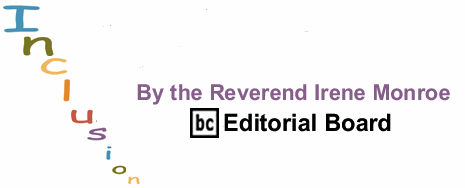
MLK Day Reflection on LGBTQ Justice

This year,
we marked 27 years of observing Martin Luther King Day. Some states began
honoring Dr. King on January 20, 1986.
King would
have been eighty-four but he was gunned down on the balcony of the Lorraine
Hotel in
Since King’s
death, every struggling civil rights group has affixed themselves to his
passionate cause for justice.
The lesbian,
gay, bisexual, transgender, and queer (LGBTQ) communities, in particular, have
been reviled for not only naming our struggle as a civil rights issue, but also
for naming MLK as one of the civil rights icons that would speak on our behalf.
But would King have spoken on our
behalf?
As we
celebrated MLK Day, 2013, we no longer had to hold King up to a God-like
standard. All the hagiographies written about King immediately following his
assassination in the previous century have come under scrutiny as we have come
to understand all of King- his greatness as well as his flaws and human
foibles.
As I comb
through numerous books and essays learning more about King’s philandering,
sexist attitude about women at home and in the movement, and his relationship
with Bayard Rustin, I am wondering, would King be a public advocate for LGBTQ
rights?
James Cone,
father of Black Liberation Theology and author of a book and several articles
on King states that we must understand King within the
historical context of the
In an
address to the Gill Foundation’s National Outgiving Conference in 2007, I said
“If Dr. Martin Luther King were standing up for LGBTQ rights today, the Black
community would drop him, too.”
King
understood the interconnections of struggles. An example of that understanding
is when Martin Luther King said, “The revolution for human rights is opening up
unhealthy areas in American life and permitting a new and wholesome healing to
take place. Eventually the civil rights movement will have contributed
infinitely more to the nation than the eradication of racial justice.”
This
statement clearly includes LGBTQ justice but would King have spoken on this
subject at that time and even now?
King’s late
wife said yes.
In 1998,
Coretta Scott King addressed the LGBT group Lambda Legal in
However,
King’s youngest and only living daughter, Rev. Bernice King, thinks otherwise.
Standing at
her father’s grave site in 2004 with thousands of protesters denouncing
marriage equality, Bernice King, who has been rumored for years to be a
lesbian, and her aunt, Alveda King, participated in a
march against same-sex marriage in
In January
2005, Newsweek asked Alveda King, the niece of Martin Luther King, who has
aligned herself with the religious right, lending her family name and voice
against LGBTQ rights, if Martin Luther King would be a champion on gay rights.
“No, he would champion the word of God,” she said. “If he would have championed
gay rights today, he would have done it while he was here. There was ample
opportunity for him to champion gay rights during his lifetime, and he did not
do so.”
And that
might be true. On the national stage, he talked vociferously about social
justice and civil rights for all people, and yet his personal life did not
reflect that ethos concerning women and gays.
Sadly,
Bayard Rustin, the gay man who was chief organizer and strategist for the 1963
March on
In the Civil
Rights movement Bayard Rustin was always the man behind the scene and a large
part of that had to due with the fact that he was gay. Because of their own
homophobia, many African American ministers involved in the Civil Right
movement would have nothing to do with Rustin, and they intentionally rumored
throughout the movement that King was gay because of his close friendship with
Rustin.
In a spring
1987 interview with Rustin in “Open Hands,” a resource for ministries affirming
the diversity of human sexuality, Rustin recalls that difficult period quite
vividly. Rustin stated, “Martin Luther King, with whom I worked very closely,
became very distressed when a number of the ministers working for him wanted
him to dismiss me from his staff because of my homosexuality. Martin set up a
committee to discover what he should do. They said that, despite the fact that
I had contributed tremendously to the organization… they thought I should
separate myself from Dr. King. This was the time when [Rev. Adam Clayton]
Powell threatened to expose my so-called homosexual relationship with Dr.
King.”
When Rustin
pushed him on the issue to speak up on his behalf, King did not. In John D’Emilo’s book, ***Lost
Prophet: The Life and times of Bayard Rustin he
wrote the following on the matter:
“Basically,
King said I can’t take on two queers at one time,” one of Rustin’s associated
recollected later.
When Rustin
was asked about MLK’s views on gays in a March 1987
interview with Redvers Jean Marie he stated, “It is
difficult for me to know what Dr. King felt about gayness....”
MLK’s
popularity was waning before his assassination. For example, many observers
argued that the plight of black
Followers of
King felt he gave more attention to loving the enemy than doing something about
the suffering of black people. Young urban black males in particularly felt
alienated from the civil rights leadership of King because his nonviolent
ideology relied too heavily on the largesse of the white establishment,
concentrated too much on eliminating segregation and winning the right to vote
in the South, and ignored the economic problems of blacks in the northern urban
ghettos.
King’s
interpretation of Black Power as “a nihilistic philosophy born out of the
conviction that the Negro can’t win” lost him these urban black males as
followers when race riots broke out across the country in 128 cities during the
period of 1963 to 1968. Disaffected observers identified the causes of the
riots as high unemployment, poor schools, inferior living conditions, the
disproportionate drafting of black men for the Vietnam War, and the
assassination of civil rights activists, none of which
they saw addressed by King’s political ideology of nonviolent direct action.
Given MLK’s waning popularity, I am beginning to ponder now if
MLK would have really raised his voice on our behalf.
Chatting on
this subject with my friend Richard, an LGBTQ ally, online wrote,
“I agree
that you have to wonder whether King would support LGBTQ rights today, even if
he felt he couldn’t in the 60s. You’d like to think he would given
his courageous stands otherwise.”
I now not
only believe that King would not have supported LGBTQ rights, but his voice and
importance on social issues would have continued to wane considerably. Coretta
keeps King’s words, theology and legacy alive by rightly attaching them to
present-day contemporary social justice issues.

BlackCommentator.com Editorial Board member and Columnist, the Rev. Irene Monroe, is a religion columnist, theologian, and public speaker. She is the Coordinator of the African-American Roundtable of the Center for Lesbian and Gay Studies in Religion and Ministry (CLGS) at the Pacific School of Religion. A native of Brooklyn, Rev. Monroe is a graduate from Wellesley College and Union Theological Seminary at Columbia University, and served as a pastor at an African-American church before coming to Harvard Divinity School for her doctorate as a Ford Fellow. She was recently named to MSNBC’s list of 10 Black Women You Should Know. Reverend Monroe is the author of Let Your Light Shine Like a Rainbow Always: Meditations on Bible Prayers for Not’So’Everyday Moments. As an African-American feminist theologian, she speaks for a sector of society that is frequently invisible. Her website is irenemonroe.com. Click here to contact the Rev. Monroe.





